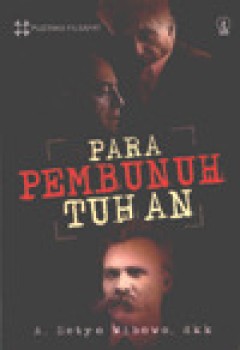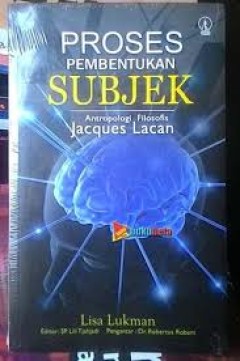Ditapis dengan
Menuju Kesejahteraan Jiwa
- Edisi
- -
- ISBN/ISSN
- -
- Deskripsi Fisik
- vi + 176 hlm.; 20 cm.
- Judul Seri
- -
- No. Panggil
- 150 ALI m
- Edisi
- -
- ISBN/ISSN
- -
- Deskripsi Fisik
- vi + 176 hlm.; 20 cm.
- Judul Seri
- -
- No. Panggil
- 150 ALI m

Perkembangan Filsafat Analitika Bahasa Dan Pengaruhnya Terhadap Ilmu Pengetahuan
- Edisi
- -
- ISBN/ISSN
- 9798658175
- Deskripsi Fisik
- vi + 167 hlm.; 21 cm.
- Judul Seri
- -
- No. Panggil
- 149.94 KAE p
- Edisi
- -
- ISBN/ISSN
- 9798658175
- Deskripsi Fisik
- vi + 167 hlm.; 21 cm.
- Judul Seri
- -
- No. Panggil
- 149.94 KAE p

A Grammar Of Motives
About this book Mr. Burke contributes an introductory and summarizing remark, "What is involved, when we say what people are doing and why they are doing it? An answer to that question is the subject of this book. The book is concerned with the basic forms of through which, in accordance with the nature of the world as all men necessarily experience it, are exemplified in the attributing of mot…
- Edisi
- -
- ISBN/ISSN
- -
- Deskripsi Fisik
- xxiii + 530 pg.; 23,5 cm.
- Judul Seri
- -
- No. Panggil
- 149.94 BUR g

The History of Scepticism From Erasmus To Descartes
- Edisi
- -
- ISBN/ISSN
- -
- Deskripsi Fisik
- xix + 242 pg.; 20,5 cm.
- Judul Seri
- -
- No. Panggil
- 149.73 POP h.a
- Edisi
- -
- ISBN/ISSN
- -
- Deskripsi Fisik
- xix + 242 pg.; 20,5 cm.
- Judul Seri
- -
- No. Panggil
- 149.73 POP h.a

The History of Scepticism From Erasmus to Spinoza
"I had read the book before in the shorter Harper Torchbook edition but read it again right through--and found it as interesting and exciting as before. I regard it as one of the seminal books in the history of ideas. Based on a prodigious amount of original research, it demonstrated conclusively and in fascinating details how the transmission of ancient skepticism was a bital factor in the for…
- Edisi
- -
- ISBN/ISSN
- -
- Deskripsi Fisik
- xxii + 333 pg.; 21 cm.
- Judul Seri
- -
- No. Panggil
- 149.73 POP h

Pergolakan Pemikiran: Kumpulan Karangan
- Edisi
- -
- ISBN/ISSN
- 9794610143
- Deskripsi Fisik
- xvi + 249 hlm.; 21 cm.
- Judul Seri
- -
- No. Panggil
- 149.7 RUS p
- Edisi
- -
- ISBN/ISSN
- 9794610143
- Deskripsi Fisik
- xvi + 249 hlm.; 21 cm.
- Judul Seri
- -
- No. Panggil
- 149.7 RUS p

Dialektika Pencerahan
Buku ini memaparkan tentang dilema manusia rasional dalam menegaskan diri, hidup, dan kedaulatannya. Gaya bahasa yang digunakan penulis sering kali bernada sinis, satir, dan penuh metafora, membuat buku ini semakin langka. Meskipun gagasan yang dituangkan di dalam buku ini belum tersistematis secara rapi, namun penulis mampu mengembangkan klaim bahwa pencarian sistematik dari akal budi dan k…
- Edisi
- -
- ISBN/ISSN
- 9799636157
- Deskripsi Fisik
- vi + 407 hlm.; 20,5 cm.
- Judul Seri
- -
- No. Panggil
- 149.7 HOR d

Risalah Pemikiran Kritis
Pada tahun 1961-1965 terjadi serangkaian perdebatan dalam suatu kongres yang diadakan di Tubingen oleh Deutsche Gesellschaft fur Sozilogie. Dalam perdebatan itu tampil Karl Raimmund Popper (1902-1994) dengan membuka diskusi mengenai logika ilmu-ilmu sosial yang dituangkannya dalam 27 butir tesis. Kemudian, seorang tokoh Mazhab Frankfurt, Theodor W. Adorno (1903-1969), menanggapi pengantar pembu…
- Edisi
- -
- ISBN/ISSN
- 9793477601
- Deskripsi Fisik
- xxix + 315 hlm.; 21 cm.
- Judul Seri
- -
- No. Panggil
- 149.2 ALB r

Para Pembunuh Tuhan
Perkembangan ilmu filsafat ketuhanan terus merangkak melahirkan pemikir-pemikir cerdas dan gigih. Dengan berbagai tinjauan, keberadaan Tuhan dibuktikan. Tapi, keberadaan itu juga mau dihantam dan disangkal. Banyak para filsuf yang meragukan kebenaran Tuhan. Bermacam argumen diajukan. Merekalah Para Pembunuh Tuhan. Tuhan … apakah Dia itu??? Selama berabad-abad manusia mencari jawab atas pertan…
- Edisi
- -
- ISBN/ISSN
- 9789792121599
- Deskripsi Fisik
- 135 hlm.; 22,5 cm.
- Judul Seri
- -
- No. Panggil
- 149 WIB p

Proses Pembentukan Subjek: Antropologi Filosofis Jacques Lacan
Buku ini menyajikan antropologi-filosofis Lacan yang bertujuan untuk memaparkan pemahaman Jacques Lacan mengenai Subjek, sekaligus melihat posisi Lacan dalam dunia intelektual, psikoanalisa, dan juga kebudayaan modern. Jacques Lacan dianggap sebagai seorang pemikir yang elah menjelaskan Subjek dengan detail. Pemikirannya memberikan sumbangsih yang besar dalam perkembangan ilmu pengetahuan dan m…
- Edisi
- -
- ISBN/ISSN
- 9789792130317
- Deskripsi Fisik
- 104 hlm.; 20 cm.
- Judul Seri
- -
- No. Panggil
- 149 LUK p
 Karya Umum
Karya Umum  Filsafat
Filsafat  Agama
Agama  Ilmu-ilmu Sosial
Ilmu-ilmu Sosial  Bahasa
Bahasa  Ilmu-ilmu Murni
Ilmu-ilmu Murni  Ilmu-ilmu Terapan
Ilmu-ilmu Terapan  Kesenian, Hiburan, dan Olahraga
Kesenian, Hiburan, dan Olahraga  Kesusastraan
Kesusastraan  Geografi dan Sejarah
Geografi dan Sejarah